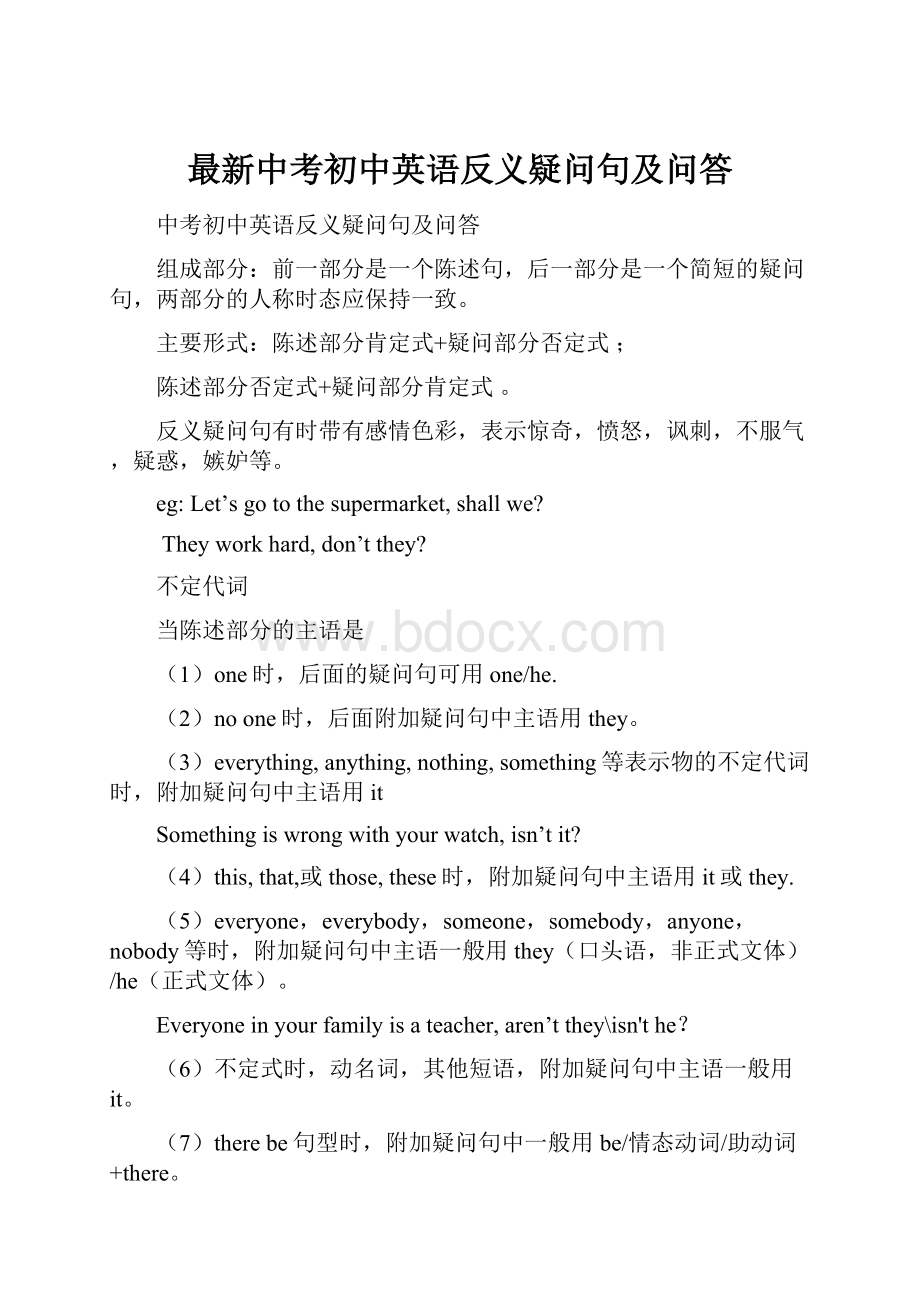最新中考初中英语反义疑问句及问答Word格式.docx
《最新中考初中英语反义疑问句及问答Word格式.docx》由会员分享,可在线阅读,更多相关《最新中考初中英语反义疑问句及问答Word格式.docx(22页珍藏版)》请在冰豆网上搜索。

Thegirldislikeshistory,doesn’tshe?
这女孩不喜欢历史,不是吗?
(3)当陈述部分有less,fewer等词视为肯定词,疑问部分用否定形式。
Therewillbelesspollution,won'
tthere?
表示主语的词
含有think,believe,suppose,imagine,expect等动词后接宾语从句构成的主从复合句在构成反意疑问句时,视情况不同有两种不同的构成方式。
(即当主句是Ithink,Ibelieve,Isuppose,Iimagine,Iexpect,Iguess时要反问从句,其余句式均反问主句。
)
(1)当主句的主语为第一人称时,其后的简短问句应与从句相一致。
例如:
IexpectourEnglishteacherwillbebackthisweekend,won'
tshe/he?
Wesupposeyouhavefinishedtheproject,haven'
tyou?
值得注意的是,当这些动词后接的宾语从句的否定转移到主句时,其仍属否定句,故其后的简短问句应用肯定式,而非否定式。
Idon'
tbelievethathecantranslatethisbook,canhe?
Wedon'
timaginethetwinshavearrived,havethey?
此类句子的回答同"
前否后肯"
型反意疑问句一样,如上述后一个句子,若双胞胎已经到了,则回答为"
Yes,theyhave."
;
若尚未到达,使用"
No,theyhaven'
t."
。
(2)当主句的主语为第二、三人称时,其后的简短问句则应与主句相一致(此时,否定只看主句,与从句无关)。
Yoursistersupposessheneedsnohelp,doesn'
tshe?
Youthoughttheycouldhavecompletedtheproject,didn'
Theydon'
tbelieveshe'
sanengineer,dothey?
Shedoesn'
texpectthatwearecomingsosoon,doesshe?
(3)但如果主句的时态是过去时等等,疑问句应和主句的人称时态保持一致。
have
陈述部分有hadbetter,或其中的had表示完成时态时,疑问句应用hadn’t等开头:
You’dbettergetupearly,hadn’tyou?
其他情况句中有have时疑问句应用don'
t等开头
如have表示“有”的时候,有两种形式:
(have表示有可用do或have来改写)
-Hehastwosisters,doesn’the?
=Hehastwosisters,hasn’the?
-Hedoesn'
thaveanysisters,doeshe?
祈使句
当陈述部分是祈使句时,疑问句要根据语气来表达,分三种情况:
1)一般情况下用willyou或won'
tyou。
Givemeahand,willyou?
Leaveallthethingsastheyare,won’tyou?
Don'
tspoilyourchild,willyou?
Takehisdirtyglovesaway,won'
2)以Let'
s(听者包括在内)开头的祈使句,前肯后可肯可否,疑问句必须用shallwe(shall只用于第一人称);
只有以Letus(听话人不被包括在“us”里面)或Letme开头的祈使句,问句才用willyou。
Letusknowthetimeofyourarrival,willyou?
Let'
stryagain,shallwe?
Letmehelpyou,willyou?
Let’shavealookonyourbook,shallwe?
3)当陈述句是否定的祈使句时,问句可用willyou或canyou。
e.g.Don’tmakemuchnoise,will/canyou?
Therebe句型
Therebe句型中,反义疑问部分必须为be动词+there
Therearesomeapplesinthebasket,aren'
Thereisn'
tanymilkleft,isthere?
thereusedtobe,反义疑问句有两种形式:
didn'
tthere和usedn'
tthere.
Thereusedtobesomecitieswall,usedn'
或:
Thereusedtobesomecitieswall,didn'
Must
.当陈述部分有情态动词must,问句有4种情况:
(1)mustn'
t表示“禁止,不可,不必”时,附加问句通常要用must.
Youmustn'
tstopyourcarhere,mustyou?
你不能把车停在这地方,知道吗?
(2)must表示“有必要”时,附加问句通常要用needn'
t.
Theymustfinishtheworktoday,needn’tthey?
他们今天要完成这项工作,是吗?
(3)mustbe表推测,用来表示对现在的情况进行推测时,问句通常要根据must后面的动词采用相应的形式。
HemustbegoodatEnglish,isn’the?
他英语一定学得很好,是吗?
ShemustbeagoodEnglishteacher,isn’tshe?
她一定是位优秀的英语老师,是吗?
(4)当musthavedone表示对过去的情况进行推测(一般句中有明确的过去时间状语),问句要根据陈述部分谓语的情况用“didn'
t+主语”或“wasn'
t/weren'
t+主语”;
如果强调动作的完成(一般没有明确的过去时间状语),问句要用“haven'
t/hasn'
t+主语”。
Shemusthavereadthenovellastweek,didn’tshe?
她上星期一定读了这本小说,不是吗?
Youmusthavetoldheraboutit,haven’tyou?
你一定把这事告诉她了,不是吗?
著名学者周海中教授在《英语附加疑问句的一个问题》一文中指出:
陈述部分的must不管是用来表示对现在的情况进行推测还是用来表示对过去的情况进行推测,附加问句都可以mustn'
t。
反意疑问句的回答:
前肯后否,前否后肯,根据事实从后往前翻译。
(1)Theyworkhard,don’tthey?
他们努力工作,不是吗?
Yes,theydo.对,他们工作努力。
/No,theydon'
t.不,他们工作不努力
(2)Theydon’tworkhard,dothey?
他们不太努力工作,是吗?
Yes,theydo.不,他们工作努力。
t.是的,他们工作不努力
否定反义疑问句的回答
当陈述部分为肯定式,反义疑问句为否定式时,其回答一般不会造成困难,一般只需照情况回答即可:
"
It’snew,isn’tit?
"
Yes,itis."
Hewantstogo,doesn’the?
No,hedoesn’t."
回答反义疑问句的原则
回答反意疑问句通常应根据实际情况来确定,如有人问你Youareasleep,aren’tyou?
你应回答No,I’mnot.因为既然你能回答,肯定你还没有asleep。
但如果别人问你Youaren’tasleep,areyou?
(你还没有睡着,对吗),你也只能回答No,I’mnot.(是的,还没有睡着),而不能回答为Yes,I’mnot.也不能回答成Yes,Iam.
“Itisabeautifulflower,isn'
tit?
”“Itisn'
tabeautifulflower,isit?
”
上述两句句子的回答肯定均为“Yes,itis."
否定为“No,itisn'
由上述例子可知,反义疑问句回答与句子本身所包含的中文肯定与否的含义并无太大关联,只需注意事实,肯定即用yes,否定用no,无需考虑句子原本是前否后肯或是前肯后否。
建议在答题时,先按照实际写后面的答句,再根据前后一致原则写Yes或No。
简要总结反意疑问句19条:
(1)陈述部分的主语是I,疑问部分要用aren'
tI.
I'
mastallasyoursister,aren'
tI?
(2)陈述部分的谓语是wish,疑问部分要用may+主语。
Iwishtohaveawordwithyou,mayI?
(3)陈述部分用no,nothing,nobody,never,few,seldom,hardly,rarely,little等否定含义的词时,疑问部分用肯定含义。
TheSwedemadenoanswer,didhe/she?
Someplantsneverblown(开花),dothey?
(4)含有oughtto的反意疑问句,陈述部分是肯定的,疑问部分用shouldn'
t/oughtn'
t+主语。
Heoughttoknowwhattodo,oughtn'
the?
/shouldn'
(5)陈述部分有haveto+v.(hadto+v.),疑问部分常用don'
t+主语(didn'
t+主语)。
Wehavetogetthereateighttomorrow,don'
twe?
(6)陈述部分的谓语是usedto时,疑问部分用didn'
t+主语或usedn'
Heusedtotakepicturesthere,didn'
/usedn'
t
(7)陈述部分有hadbetter+v.疑问句部分用hadn'
You'
dbetterreaditbyyourself,hadn'
(8)陈述部分有wouldrather+v.,疑问部分多用wouldn'
Hewouldratherreadittentimesthanreciteit,wouldn'
(9)陈述部分有You'
dliketo+v.疑问部分用wouldn'
dliketogowithme,wouldn'
(10)陈述部分有must的疑问句,疑问部分根据实际情况而定。
Hemustbeadoctor,needn’the?
YoumusthavestudiedEnglishforthreeyears,needn’tyou?
Hemusthavefinishedityesterday,needn'
(11)感叹句中,疑问部分用否定的助动词加sb/sth?
【1】Whatafinedayitistoday,isn’tit?
【2】Howfastheruns,doesn’the?
【3】Whatalongtimewehavebeenwaiting,haven’twe?
(12)陈述部分由neither…nor,either…or连接的并列主语时,疑问部分根据其实际逻辑意义而定。
NeitheryounorIamengineer,arewe?
(13)陈述部分主语是指示代词或不定代词everything,that,nothing,this,疑问部分主语用it。
Everythingisready,isn'
tit?
(14)陈述部分为主语从句或并列复合句,疑问部分有三种情况:
a.并列复合句疑问部分,谓语动词根据邻近从句的谓语而定。
Mr.SmithhadbeentoBeijingforseveraltimes,heshouldhavebeeninChinanow,shouldn'
b.带有定语从句,宾语从句的主从复合句,疑问部分谓语根据主句的谓语而定:
Heisnotthemanwhogaveusatalk,ishe?
他不是给我们演讲的人,是吗?
HesaidhewantedtovisitJapan,didn'
他说他想去日本参观,不是吗?
c.上述部分主句谓语是think,believe,expect,suppose,imagine等引导的宾语从句,疑问部分与宾语从句相对应构成反义疑问句。
tthinkheisbright,ishe?
Webelieveshecandoitbetter,can'
(15)陈述部分主语是不定代词everybody,anyone,somebody,nobody,noone等,疑问部分常用复数they,有时也用单数he。
Everyoneknowstheanswer,don'
tthey?
(doesn'
Nobodyknowsaboutit,dothey?
(doeshe?
(16)带情态动词dare或need的反意疑问句,疑问部分常用need(dare)+主语。
Weneednotdoitagain,needwe?
Hedarenotsayso,darehe?
当dare,need为实义动词时,疑问部分用助动词do+主语。
tdaretogohomealone,doesshe?
(17)省去主语的祈使句的反意疑问句,疑问部分用willyou。
tdothatagain,willyou?
Gowithme,willyou/won'
tyou?
注意:
Let'
s开头的祈使句,后用shallwe?
Letus开头的祈使句,后用willyou?
(18)陈述部分是"
therebe"
结构的,疑问部分用there省略主语代词。
Thereissomethingwrongwithyourwatch,isn'
Therewillnotbeanytrouble,willthere?
(19)否定前缀不能视为否定词,其反意疑问句仍用否定形式。
Itisimpossible,isn'
Heisnotunkindtohisclassmates,ishe?
有些动词如:
costhurthitput等,它们的过去时与原型相同,在肯定句中一定要先弄清楚它们是什么时态:
(20)Theskirtmadeofsilkcostyoualotofmoney,()?
A.didn'
titB.didn'
tyou
C.doesn'
titD.don'
陈述部分的谓语
疑问部分
I/主语
aren'
tI/areI
no,
肯定含义
oughtto(肯定的)
oughtn'
t+主语
haveto+v.(hadto+v.)
don'
t+主语)
usedto+v.
hadbetter+v.
hadn'
wouldrather+v.
wouldn'
you'
dliketo+v.
must
根据实际情况而定
感叹句
be+主语
指示代词或不定代词everything,that,
nothing,this
主语用it
并列复合句
谓语根据邻近从句的谓语而定
定语从句,宾语从句主从复合句
根据主句的谓语而定
think,believe,expect,
suppose,imagine等引导
与宾语从句相对应的从句
everybody,anyone,somebody,nobody,noone
复数they,单数he
情态动词dare或need
need/needn'
t(dare/daren'
t)+主语
dare,need为实义动词
do/don'
省去主语的祈使句
will/won'
tyou?
s开头的祈使句
Shallwe?
Letus开头的祈使句
Willyou?
therebe
相应的谓语动词+there(省略主语代词)
否定前缀不能视为否定词
仍用否定形式
一、英语阅读理解专项练习试卷
1.阅读理解
ThatcoldJanuarynight,IwasgrowingsickofmylifeinSanFrancisco.ThereIwas,walkinghomeatoneinthemorningafteratiringpracticeatthetheatre.Withopeningnightonlyaweekaway,Iwasstilllearningmylines.Iwashavingtroubledealingwithmypart-timejobatthebankandmyactingatnightatthesametime.AsIwalked,IthoughtseriouslyaboutgivingupbothactingandSanFrancisco.Citylifehadbecometoomuchforme.
AsIwalkeddownemptystreetsundertallbuildings,Ifeltverysmallandcold.Ibeganrunning,bothtokeepwarmandtokeepawayfromanypossiblerobbers(抢劫犯).Veryfewpeoplewerestilloutexceptafewsad-lookinghomelesspeopleunderblankets.
Aboutablockfrommyapartment(公寓房间),Iheardasoundbehindme.Iturnedquickly,halfexpectingtoseesomeonewithaknifeoragun.Thestreetwasempty.AllIsawwasashiningstreet-light.Still,thenoisehadmademenervous,soIstartedtorunfaster.NotuntilIreachedmyapartmentbuildingandunlockedthedoordidIrealizewhatthenoisehadbeen.Ithadbeenmywalletfallingtothestreet.
SuddenlyIwasn'
tcoldortiredanymore,andIranoutofthedoorandbacktowhereI'
dheardthenoise.AlthoughIsearchedthestreetanxiouslyforfifteenminutes,mywalletwasnowheretobefound.
JustasIwasaboutt